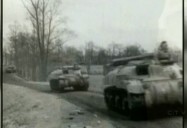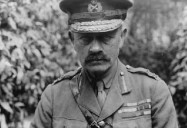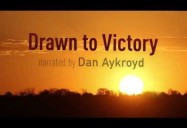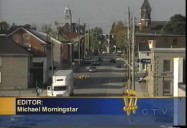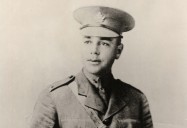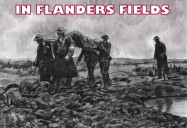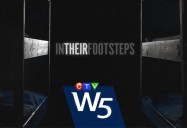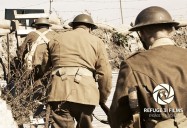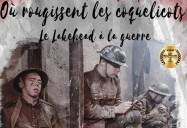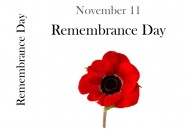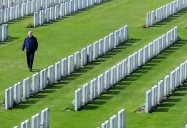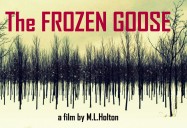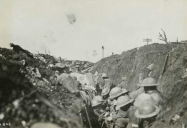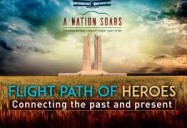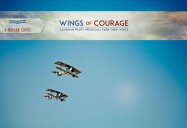
- Waterloo Catholic D S B Streaming Playlist
- WCDSB - After the Last River Playlist
- WCDSB - Remembrance Day Playlist
WCDSB - Remembrance Day Playlist
In Their Footsteps: W5
Width Height
Grade Level: 9 - 12, Post Secondary, Adult
W5's Sandie Rinaldo joins a group of Canadian high school students, chaperones, and Holocaust survivors on a journey from Toronto to Poland as they embark on an annual pilgrimage known as the March of the Living, an emotionally grueling tour of Nazi concentration camps. The tranquility of the notorious concentration camps Auschwitz, Birkenau, Treblinka, and Majdanek mask the terror that occurred in these vast, menacing places, synonymous with atrocities committed by the Nazis. W5’s “IN THEIR FOOTSTEPS” charts the course of the tour group from Canada, as they set off on a somber journey of remembrance to places of stark brutality to honour the millions of victims who perished in these places, and celebrate the spirit of resilience.
In this special, full-hour report, W5 takes viewers inside the remarkable stories of survivors, including 88-year-old Nate Leipciger, who was held captive in seven different camps in less than two years, losing more than two dozen family members in the Holocaust. W5 also speaks to Angela Orosz, who miraculously was born in secret inside the Birkenau concentration camp – weighing just over two pounds. Her mother, Vera Bein, was subjected to cruel medical experiments while imprisoned and survived on less than 400 calories a day during the pregnancy. Angela weighed little more than two pounds at birth and remarkably went undiscovered in the barracks until the camp was liberated a month later. She went on to live a long, healthy life in Canada.
W5 captures the life-changing experience among the students traveling – from the raw and devastating emotions they experience, to the hope that flourishes amidst the monuments and memorials – reminding a new generation that such atrocities must never be allowed to happen again.
|
Running Time: 40:00 Country of Origin: Canada Captions: |
Producer: CTV Copyright Date: 2016 Language: English |
Video Chapters
-
In Their Footsteps: W5 40:00
W5's Sandie Rinaldo joins a group of Canadian high school...
TRANSCRIPT
Close- Hello, and thanks for joining us. It's one thing to read about hate, another to hear about it, but to immerse yourself completely in a place in time when hate was all that thrived, when it flowed unchallenged, well, that's a much more intense lesson. This week, we're accompanying a group of Canadian high school students, who were overwhelmed by a place where millions were murdered. As Sandra Rinaldo captures, it was a time when surviving took everything you had, and even then, it usually wasn't enough.
- [MUSIC PLAYING]
- If it is possible for a place to be evil, then surely this is among the most evil places on earth. It may seem peaceful now, but it is not a place of peace. It is a place of war, of mass murder, and, ultimately, of genocide. This is the notorious Auschwitz concentration camp, a place that's synonymous with atrocities committed by the Nazis.
- And just three kilometers away, Auschwitz II, also known as Birkenau, a vast and menacing place, that tranquility masks the terror that occurred here. Entire families spent their last moments together, being transported along these tracks. The victims were brought here from all across Europe. Many were Soviet, Polish, or Roma, but most, by far, were Jewish. In all, more than a million people were murdered here.
- Miraculously, some prisoners managed to avoid death at these and other concentration camps. That was more than 70 years ago, and now, with each passing year, fewer and fewer of those survivors remain. But half a world away, a Toronto high school is hosting one of those survivors.
- You have a choice--
- A Canadian, 88-year-old Nate Leipciger, and he has a remarkable story to tell.
- So there I stood, at the age of 15, in the shadows of the gas chambers.
- Nate makes at least a dozen speeches like this every year. He's even written a book, recounting his nearly two years as a teenage Jewish prisoner in Nazi concentration camps.
- This is here now in a concentration camp, Auschwitz, too. If you did something against the rules, you will be sent to the gas chamber.
- There you go. Guys, write big.
- Big, big. Can't see otherwise.
- 17-year-old Riley Colton is Nate's great niece. She and other grade 11 students will soon be embarking on a profound journey to learn more about the horrors of the Holocaust. Alongside Nate and other survivors, they will travel to Poland to visit the former Nazi concentration camps.
- I'm prepared for it to be very emotional, but I'm excited, not in a happy way, in a way that I'm going to see something that I've never experienced before.
- You're going with Nate on this trip. So how important is it for you that you're taking this trip with your family.
- There's a connection when you go with your family, and it makes it even more special.
- Really?
- Family is also the focus for 16-year-old Isabelle Shapiro. She's taking this trip as a way to better understand her family's history, especially when it comes to her beloved grandmother, Helen Rosenbaum.
- That's a big deal. My grandmother and I have such a strong bond, we seem so alike, and because of this, I feel like I know her as a grandmother, and I know her as my friend, in some ways.
- Helen was just a toddler when she and her family were forced to flee Poland after the Nazis invasion. Eventually, she immigrated to Canada in 1947.
- It's emotional. It is emotional, you know, for her to go. I'm glad that the world is different now, and that she is going back, and she will see where I come from.
- So why do you want to do this trip?
- It's so extremely important, in so many ways. This important event in history has really stuck with me, but the other reason I'm doing it is because I'm going to be the first person to ever go back.
- In your family?
- In my entire family. My grandparents have said that it was too hard for them. It's too much of a horror story. So if they can't go back, then I feel like it's my responsibility to go back and say, I'm here. We survived. Look at what has been created from all that.
- One month later, it's departure day. Isabel, along with Riley, are among 213 students, 22 chaperones, and 9 Holocaust survivors, who have descended on Toronto's Pearson International Airport.
- Do you have any liquids, gels, springs inside?
- They've got a long day ahead of them, but that doesn't seem to be dampening anyone's enthusiasm.
- I'm really nervous, but like really excited. I can't wait. It's going to be the trip of a lifetime.
- Hi.
- Hi.
- How are you?
- My niece. Ah, wonderful, wonderful.
- Are you excited?
- Absolutely. Are you excited?
- Yeah, I'm nervous, but I'm excited.
- So am I.
- With so many people traveling together, they've chartered their own plane for the nine hour, overnight flight. Next stop-- Poland.
- All right. Let's move together, guys.
- [INTERPOSING VOICES].
- A day and a half later, and the Canadian contingent is about to begin an emotionally bruising day.
- And today, we're going to see a concentration camp, but also an extermination camp-- a death camp.
- This is the infamous Auschwitz concentration camp. It was the epicenter of the Nazis' attempted annihilation of the Jews. Over the course of five years, prisoners were shot along this wall. They were hung from these gallows. But most were put to death in this gas chamber, where victims scratch marks still line the walls.
- This is a place where your life expectancy was three to four months.
- Nate has taken part in this tour more than a dozen times. And at every stop along the way, he tries to drive home to the students just what life was like here.
- Either you are sent to Germany, or you will be sent to the gas chamber.
- Auschwitz is now a museum, though one with a deeply sinister feeling. On display, items confiscated by the Nazis. Suitcases still show the prisoners' names. There's an entire corridor surrounded by 100,000 shoes, even a massive and mind-boggling display of human hair.
- The rest of the things were cleaned, sorted out, and distributed among majority of civilians and soldiers.
- And in 1942, when the Nazis decided the original camp wasn't big enough to accommodate their murderous ambitions, they expanded, creating Birkenau, just three kilometers down the road.
- These photos were taken by the Nazis, documenting the life in Birkenau.
- Prisoners were generally transported here in overcrowded rail cars.
- There was a train right here.
- The lucky ones were warehoused in the rows upon rows of barracks. At its peak, more than 90,000 prisoners were here at a time, but many, many more were murdered here. Their bodies burned in the crematoriums.
- Watch your step.
- Nate was 15 years old when he was brought here alongside his family.
- Talk to me about the day that you first arrived at Auschwitz-Birkenau. What do you remember about that day?
- When we arrived here, we arrived as a family in the boxcar. And the doors were opened, and suddenly shouts and barking dogs, and we had to disembark. They started to shout and push, and tear us apart. And I stood with my mother. And my father-- my father pulled me away. I didn't know that that was the last time I'm going to be with my mother.
- You never saw your mom and sister again?
- No.
- Along these tracks, his family's fate was sealed. His mom, [? Leah, ?] and 18-year-old sister, [? Linka, ?] were taken to the gas chambers. Lucky for Nate, his dad managed to persuade the German guards his young son would be a good worker. They were assigned to a barrack, just like this one.
- I'm 88, and my name is 133,628.
- Nate was held captive in seven different concentration camps in less than two years. Birkenau was the first.
- This was my home for 88 days. And each day is a day of my life.
- All of those days spent here were wretched to be sure. But it was the first day that stands out the most.
- Children crying. Mothers sobbing. Children running, having lost their parents. And I knew that if I'm going to stay here, I would be sentenced to death.
- And standing by his side, as he relays his story, Nate's doting grandson, Jason Green, a chaperone on this trip.
- I can feel that, standing beside him, I give him comfort and, hopefully, strength. I feel very proud to be able to be here.
- What an unearthly thought.
- Nate's story is a difficult one to hear and process for Jason, and many of these students.
- Being sent out of the camp meant the possibility of life, and staying here meant death. I just wanted to live. Thank you.
- [APPLAUSE]
- And when the speech is over, several students come forward, overwhelmed by what they've just heard, and wanting to spend a moment up close with Nate, to thank him, but, mostly, to comfort him, and, in turn, be comforted, including one of his own relatives, Riley.
- Thank you. Thank you for being here.
- Thank you for speaking.
- What's it been like for you to be here today?
- Very, very mixed emotions. The memories are very fresh. They come up. They jump up at you. And the tragedy is horrendous.
- But it doesn't get any easier, or does it? Every year you've come back.
- It's harder.
- It's harder. Why is it harder?
- Well, you're emotionally more unstable. You're--
- Vulnerable.
- More vulnerable. You more easier to cry or to, you know, to have your voice crack. It's not pretty, but I think it had to-- the world has to know of what human beings are capable of, and what it takes to survive, to what extent you will go in order to survive a day, a month, a year. And those memories are very hurtful. They're very painful. They affected me for all my life. All my life, I thought about this. And I couldn't forget it. So I lived with death for all these years.
- And you didn't forget anything?
- I didn't forget anything.
- For centuries, Warsaw has been the cultural and political capital of Poland, a stunning and vibrant city filled with proud, patriotic citizens. This was once a major center of Jewish life. Prior to the Second World War, Jews made up nearly a third of the population of Warsaw.
- These Jewish high school students are on a guided bus tour of Poland called March of the Living. They're here to learn about the Holocaust. It's been an awfully somber journey so far, but right now the mood on the bus is light and playful.
- [INTERPOSING VOICES].
- As part of their trip, they're exploring the history of Jewish life here.
- Let's not wake them up, OK, keep it silent.
- And today, their tour has brought them to a 200-year-old Jewish cemetery.
- Now why would we see the cemetery? Like why not visit another camp?
- Here they can see something they won't see through the rest of their journey, the marked graves of Jews. This massive cemetery contains an astonishing 200,000 tombstones, but that's only a fraction of the 3 million Jews killed in Poland during the Holocaust, most without a final resting place, places like this one, about 100 kilometers away in the midst of the lash Polish countryside.
- Another site made infamous by the Nazis, the Treblinka concentration camp.
- In 1941, this was the site of a Nazi forced labor camp where mostly Polish and Jewish prisoners worked 12 to 14 hours a day. Then a year later, the camp expanded and became something even worse, the Nazis' most brutally efficient murder factory. At its peak, 17,000 people were gassed to death here on a daily basis. More than 800,000 people in all. And unlike the one in Warsaw, there is no true cemetery here. Instead, these stones serve as a symbolic cemetery.
- Canadian students and survivors wander through the grounds in search of specific stones. 216 stones represent the Polish hometowns of the victims.
- Which one was his first name, like his original name?
- It gives mourners a place to pay their respects to family members killed here. And that's what Canadian Holocaust survivor Nate Leipciger, along with his grandson, Jason, a chaperone on the tour, intend to do.
- Do you have the list?
- They want to pay their respects at the stone representing the hometown of Nate's grandparents and other relatives.
- At last, they spot it, the stone representing the town of Czestochowa.
- This is the only monument that I have that would allow me to say we, remember you.
- Two dozen of Nate's family members from Czestochowa were killed by the Nazis.
- My family members who, according to the records, brought to Treblinka, and they were murdered here. My grandparents would not have imagined that, even so they didn't survive, one of the grandchildren would survive and have a family.
- A family that will grow to include Jason, who is always there to support Nate.
- And that's why I'm not falling apart, because you give me strength and calmness.
- Nate, does it ever get to a point where it's overwhelming, it's too much?
- Well, you have to control it. You have to hold back. If you don't, you fall apart, and you can't do this. You have to control your emotions. You have to prepare yourself mentally.
- I've looked at it. It's important to be able to face it. It's part of the understanding, healing, and be able move forward, so it's not too much. It's a lot, but it's never too much.
- Who's supporting who here? Are you supporting your grandfather?
- He's supporting me.
- And soon, Nate is offering that support to another member of his extended family, 17-year-old Riley Colton, his great niece, has come to pay her respects at the Czestochowa stone, too.
- 24 people.
- From the town.
- Over 3 million murdered here. [INAUDIBLE]
- It's crazy.
- They were wonderful human beings.
- The enormous memorial here is intended to ensure future generations never forget the human beings who were killed here, nor the depths of human depravity. But not every Nazi mass murder site in Poland has an equally massive memorial. The next stop on this traveling tour, an hour and a half away, is a serene setting that holds a ghastly past.
- On August 25th, 1941, Nazi soldiers rounded up all the Jews from a nearby town, and brought them here, to the Lupohova Forest. They were marched less than a kilometer in from the main road to the spot where they were executed on mass. Their bodies dumped into pits and buried, some still alive.
- And in three days, the community of 2,250 people would be destroyed.
- For more than a moment, the students stand in silence, in remembrance of the victims. Words don't come easily in a place of such stark brutality. So instead, they turn to a song for solace.
- [SINGING] What will become of the memories? Are they just scattered with the dust in the breeze. Who will stand before the world, knowing what to say--
- This song really connects you to moments when you don't really have the other words to use
- 16-year-old Isabel Shapiro knows the visit here has had a profound effect on her.
- What lesson do you take away from the forest?
- That, seriously, being able to remember and be able to put yourself in the shoes of those who had to go through such horrible circumstances, and it was one of the most blunt realizations ever. When we just got there, we were walking through a forest. And this is where hundreds of people died, for no reason. And I was walking out of there thinking, these people never got to walk out of here.
- And Isabel is clearly not the only one coming to terms with that blunt realization. For others, the thought of the needless and horrific deaths that happened here is overwhelming.
- How do you make sense of atrocities?
- The best they can do is seek comfort in each other.
- As Sandie Rinaldo was showing us, Holocaust survivor, Nate Leipciger, is helping young Canadians get a much more intimate understanding of the lives and the loss of Jews and others in the Nazi concentration camps. Well, now Nate's journey is a much more personal one, as he confronts his own past, and the demons who stole so much of it.
- It is a Tuesday morning in early May, and six busses full of Canadian high school students, chaperones, and Holocaust survivors are traveling through the Polish countryside. They are here for an emotionally grueling tour of Nazi concentration camps. But one member of their contingent won't be taking part on this day.
- My cousin used to live down the street here. And this used to be a grocery shop.
- 88-year-old Canadian Holocaust survivor, Nate Leipciger is returning home to the neighborhood where he grew up in the town of Chorzow.
- That's it. Right here. That's my apartment building. Nothing changed. It's amazing. Nothing changed.
- From the street, it may look like nothing has changed, but Nate wants a closer look.
- Looks like it's open. Amazing. Unbelievable. 70 years just suddenly disappears. 80 years almost.
- Nate and his family lived here until he was 11 years old.
- And unbelievable, my apartment is blocked up. It's all blocked up. It is in disrepair. Terrible disrepair.
- And while 77 years have passed since then, his memories of his childhood here are undiminished.
- Can't shut them out, you know? I mean, you know, to be able to climb up to the fence, you know, that was a major accomplishment, right, for 7, 8-year-old boy. I used to dream about it-- the upper were the more expensive apartments, lower were the cheaper apartments.
- Nate lived on the lower level with his sister and parents.
- We were not rich, but I didn't know that we were poor. You know? This small family living in peace, working hard to make a living, never foresaw the tragedy, never foresaw the tragedy.
- The first signs of the horror and tragedy to come arrived in September, 1939, when the Nazis invaded Poland. Chorzow was to be free of Jews, and Nate's family, like so many others, was ordered out of their home.
- And when the Nazis marched in, all the flags came out of the windows, all the swastikas were flying overnight.
- Over the next four years, his family would be confined to Jewish ghettos before, ultimately, being transported to the Birkenau concentration camp.
- That's how they ruined our life. And this ruin sort of represents the ruins of our life.
- Nate has been told the building is slated for demolition. But the loss of his childhood home causes him no grief.
- In a way, I'm glad that it's going to be torn down. People are not here anymore. So, you know, life outside continues on. And here, it's at an end. You know? Almost, you almost say, maybe that's the way it should be. Well, that's the last time I'm going to be here for sure. Goodbye.
- The decision as to whether you're going to live or die was made right here.
- Like Nate, Canadian, Bill Glied was brought here to the Birkenau concentration camp, alongside his family as a teenager.
- This is where we came, my mom and dad, my sister, my relatives, right here. And this man was standing right over here, and well, we were all lined up-- women over there, men over there, five in a row. At the moment that he said, this way, you were dead. You were dead, because after that the rest was just the process. The rest was just a factory where they got you in, where they gassed you, there they cremated you, where they threw the ashes into a pond.
- Listening to Bill's testimonial is a chilling experience for students like Isabelle Shapiro, standing in a place where Bill's mother and sister were taken from him to be murdered. She's already older than he was at the time.
- Sometimes when we're here, when we're at the locations of the horrible, horrible sights, it's really hard to connect at first, because the thought of so many people dying here, in such a brutal way, it's almost so shocking that you-- it can't really draw emotion right away.
- A million people, a million people were sentenced to death and died right here on this ground.
- The idea is almost inconceivable to students like Riley Colton.
- Does it feel real to you? Do you actually believe that 1.1 million Jews were annihilated here?
- It's hard to believe. I definitely believe it, but it's so hard to imagine. I find it very difficult. And I think it's different when you actually come here than when you see in pictures and movies, but it's so hard to imagine that someone could have this idea to kill this many people, and torture this many people. It's like insane.
- But, during the time of the massacre, what can only be described as a miracle occurred. In amongst all the death, a tiny baby was born. She was given little chance to live. Her mother, Vera Bein, a prisoner at Birkenau, was told her newborn daughter would soon be with the angels. So she called her Angela.
- But Montrealer, Angelo Orosz, did live, making her one of the most unlikely of Holocaust survivors. And today, she is returning to those barracks.
- Angela, this is the first time you've been back to Auschwitz-Birkenau, to the barracks, since you were an infant, since you were born here. What was it like for you to be inside that place?
- It was very, very hot. I saw those beds, and I was wondering-- how did she go up on the third one? There was no nothing. How did she climb up, being in labor? How did she give birth there? Without a voice, she was not allowed to say a word, because they would discover it. How did she do this?
- When you asked her, what did she say?
- Oh, you know, I just did it.
- I had to do it.
- Yeah.
- For you. How did she keep her pregnancy hidden?
- They lived on 300, 400 calories a day. It didn't show. The pregnancy didn't show.
- But there was one person who did know about the pregnancy, the infamous Nazi physician, Dr. Josef Mengele, renowned for the bizarre and sadistic experiments he conducted on prisoners, including Vera.
- On day, Mengele called her in. And they injected into my mother's cervix some kind of chemical, which she never could find out what it was, but it was terribly painful. Then, next day, she got an another injection, and the pregnancy, the opposite side. And he played that game with her for a while. It's really a miracle, you know, my brain developed.
- It's a miracle that's you're normal. It's a miracle that you're here today. It's a miracle that your mother survived through all of this. Did he not pay close attention to her after the experiment?
- They don't know what happened, but, all of a sudden, after experimenting awhile, he just didn't call her in anymore. And just hours, after being born in secret here, on December 21st, 1944, the infant, Angela, weighing only 2 pounds 2 ounces, was left all alone. Vera had to report for roll call, so she wrapped up her newborn baby, and hid her in the top bunk.
- After 3 hours, she gave birth. She had to go out in the freezing December, without shoes, without proper clothes. She said, I was just praying, I hope when I come back, I find her. I hope while I'm gone, she's there. They didn't discover. Could you imagine the stress?
- No.
- Remarkably, Angela went undiscovered. She would live the first month of her life in hiding here. Until January 27, 1945, when the prisoners at the camp were liberated. Years later, Angela, along with her mother, would immigrate to Canada, where this one-time Birkenau baby has done what everyone, but her mother, thought impossible, live a long and healthy life.
- Nobody, nobody believed, I believe. Only her.
- It has been an emotionally grueling and grief-filled tour through the former Nazi concentration camps across Poland. But today will be different, a sense of celebration is in the air. A massive international gathering is taking place, with the Canadian students at the center of it all.
- [INTERPOSING VOICES].
- It's a joyous gathering in stark contrast to the mood through most of the rest of the trip. 10,000 people have descended on Auschwitz. It's a starting point for an annual pilgrimage called March of the Living, a 3 kilometer walk to the Birkenau concentration camp to honor the victims, but also to celebrate the spirit of resilience. The streets and courtyards are filled with people from all around the world. Jews from nearly 50 countries are taking part.
- Let the march begin.
- [HORNS BLOWING]
- Toronto's Bill Glied is a Holocaust survivor, who was brought to Birkenau with his family, when he was just 13 years old. He's taken part in the march seven times before, but says being here is never easy.
- I think that as you come back and you start to relive the memories and the incidents, the thing becomes so much more real, and so much more crystal clear. And I could recall my family arriving there in the clearance, and the fact that my mom and my sister sort of disappeared within seconds, and I never saw them again.
- [SINGING]
- The march is awfully slow moving at first, but no one seems to mind. Eventually, they make their way off the grounds of Auschwitz, and onto the streets. The Canadian contingent is the largest one of them all, nearly 700 people, the vast majority high school students like 17-year-old Riley Colton.
- So you're finally here.
- Yes.
- This is what it was all about, right?
- Yeah.
- I mean, to this, feeling emotional, feeling happy, describe your feelings.
- I think it definitely emotional, but I think it's also a happy feeling, because we, as young people, are like filling our duty to carry on the memory of the people that perished in the Holocaust.
- For some like Isabelle Shapiro, the march is an unnerving experience.
- Is it hard for you to do this?
- A little bit, I really feel that in some ways, I feel very uncomfortable in different ways, that I know there are train tracks right there where maybe some of my relatives have gone to [INAUDIBLE], and it's really-- you feel this sort of sense of somewhat unity with all the people walking around you, but also frightening, something I can't explain, just very scary.
- The frightening reality of what happened here.
- Yes.
- It takes a little more than two hours, but eventually their destination is in sight, Birkenau. Many of these students are here to honor relatives, who are among the more than a million people murdered here. That's not the case for Angelo Orosz. She's here to remember her mother, who gave birth to her in the barracks here.
- So you walked here today in your mother's memory for everything she did, giving birth to you in that barracks. There she is. Has it been difficult? Is it emotional?
- Yes, it was very emotional now, but the kids helped. The kids took away-- I saw the kids, and it helped. They're smiling, and you see 10,000 kids.
- But those kids aren't all smiles anymore. That sense of triumph that filled the streets in Auschwitz earlier in the day has subsided. In its place, a crushing since of sadness. At the train tracks, leading into the gates of Birkenau, a temporary memorial takes shape. Candles are lit. Photos of family members are left behind, along with a litany of notes of remembrance, most making the same vows, never forget.
- Six days from when they first arrived in Poland, the Canadian high school students are coming to the end of their tour. On this last day, they visit one final concentration camp, the best preserved in all of Poland. It's called Majdanek.
- We're going to a place, at the entrance of the camp now, where the gas chamber was.
- Tens of thousands of Jews from across Europe were sent here. By July, 1944, when the remaining prisoners at the camp were finally liberated, an estimated 80,000 people were murdered here. Unlike other concentration camps hidden in forests or small towns, this one is right in the center of a city.
- That's crazy. You're just driving to work, and then you're just like, [INAUDIBLE] Majdanek. That city is Lublin, and it's where Isabel Shapiro's grandmother, Helen, was born, and her family had to flee in 1940. Back in Toronto, the sun isn't even up yet, but Helen is already starting her day. She's awaiting a call from her granddaughter. Helen never returned to Poland. It was just too painful. So Isabelle is doing the trip in her place.
- Hello.
- Hi, boo.
- Hi, Isabel. How are you?
- I'm good. How are you?
- I'm good, honey, I'm good.
- Throughout the trip, Isabelle has carried a photo of Helen as a toddler living in Lublin.
- As we were driving through, I was looking at the picture I have of you in the stroller, I'm so proud to be going back here for you. I know that it's still hard for you.
- You are so precious, and having you there makes me think about what was. As a child, oh, my goodness, and to have my granddaughter there, it is unbelievable, unbelievable, honey.
- I'm so glad that I got to have this experience of being able to remember and to learn about the Holocaust, and to really understand what you went through. I love you so much.
- I love you, too, honey. I love you, and I appreciate you being there.
- OK, I love you, too. Bye.
- Bye, my darling, love you.
- Bye.
- Bye bye.
- Good feeling inside to speak to her?
- Yeah. I think that it made me feel more connected, and it was really emotional, and I think that getting to speak to her makes her feel happy because she knows that I'm really understanding and getting the true meaning out of this trip.
- But understanding the true meaning of this trip will likely take some time. How can anyone fully process their thoughts and feelings while gazing into a gas chamber? So many of the places they visited trigger such raw emotions, like here, at the mound of ashes which contains the remains of cremated victims. Up above is engraved a haunting message-- los nasz dla was przestroga-- let our fate be a warning to you.
- So, Ally, this has not been easy, has it?
- No.
- What about this whole experience?
- I think all of it has been equally like the same. It's kind of hard to believe, so I think that's harder. It's hard to be emotional, because it's hard to believe that any of this could have happened. So when you see something real like that, it really-- it's really hard.
- To have done this journey with Nate, to have done it with family, with Jason, did that help?
- Yeah, it definitely helped, and it definitely made it special, like I was-- I'm sorry--
- That's OK. It's OK.
- When I talk to the kids, and I see their faces, and I see their emotions, I am moved by their emotion. And I say to myself, it's all worthwhile.
- And worthwhile for the students, too, a truly life-changing experience that, at times, has been both devastating and thought-provoking.
- I think that what I'm going to take away from Poland the most is that even though such horrible things happened at so many locations in this country, life still flourishes, and there's monuments, and there's memorials, and we don't forget, but we learn to live with it, and we learn to make sure that this never happens again.
- Planning is already under way for the next March of the Living trip. And as long as his health allows, Nate plans to be part of it again, for the 17th time. W5 continues in a moment.
- You can always share what you've seen, or maybe watch it again, by heading to our website, w5.ctvnews.ca. And if you'd like to comment on what you've seen, or maybe suggest an investigation, please head to our W5 Facebook page. On behalf of the W5 investigation team, I'm Kevin Newman. Thanks for sharing your time with us.
- [MUSIC PLAYING]
TRANSCRIPTS:
Interactive Transcript
Transcript (PDF)
